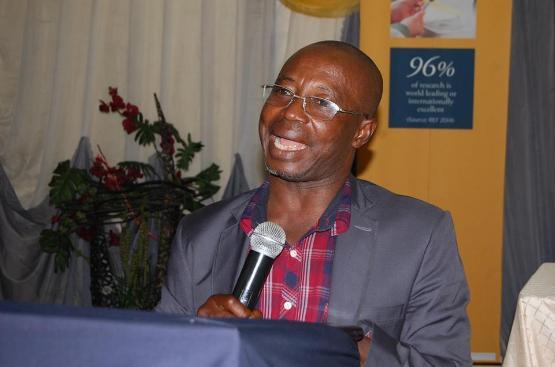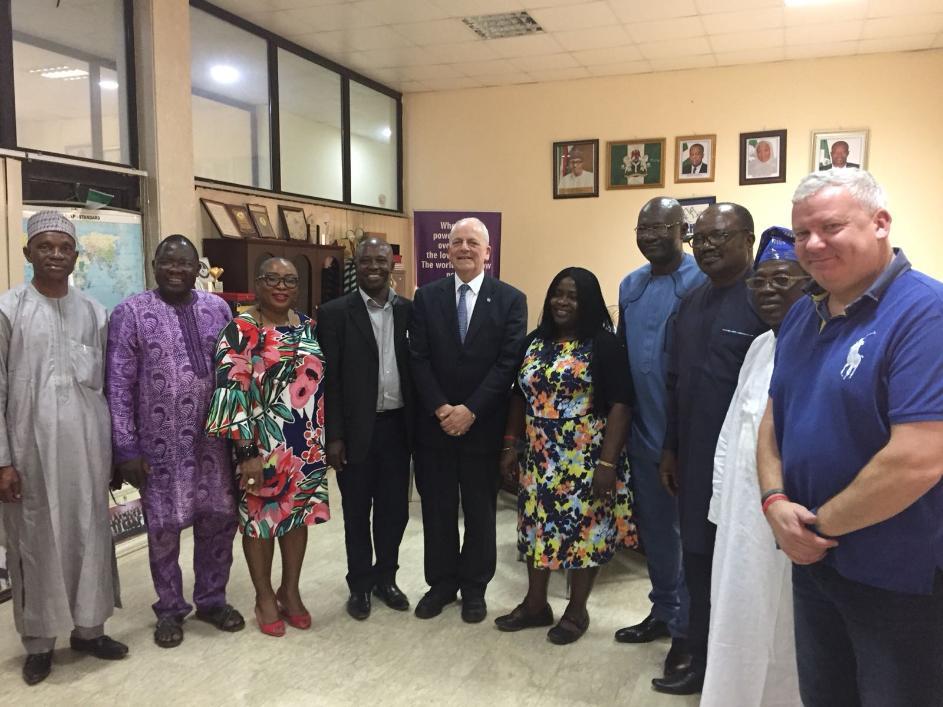Peace building in Africa
The University has an impressive alumni network across West Africa, with Bradford graduates working at very senior levels in government authorities, educational institutions and in the private sector. Professor Oshita Osang Oshita is one such example. He obtained an MA in Peace and Conflict Studies from Bradford in 2004, something he describes as “life changing”, and is now Director General and CEO of the Institute for Peace and Conflict Resolution (IPCR) in Nigeria.
Well known as an expert in governance, peace and conflict studies, Professor Oshita has done consultancy work for a number of high profile international organisations, including the United Nations. Professor Oshita spoke to Braduate to give an insight into his background, his career and why he believes the University of Bradford has such a unique link with West Africa.

Professor Oshita Oshita, MA Peace and Conflict Studies 2004
What do you remember most from your time at Bradford and what impact did your degree have on you?
Bradford was a wonderful place for me and my family, the global community I encountered on the Bradford Peace Studies programme remains something I couldn’t have discovered anywhere else. For me, the University of Bradford was a vibrant example of the diversity that the world has to offer; all parts of the world were represented in my class in one form or another.
The University of Bradford has a track record of producing top-level graduates within the areas of peace and conflict – can you comment on this from an African perspective?
Bradford Alumni have been directly involved, or backstopped, for key mediators and negotiators in different parts of Africa. Some are in government and others are in the international development sector, while others hold important political leadership positions at ministerial level. There is even a Deputy Prime Minister, elsewhere in Africa, who is a Bradford alumnus.
You have been at the Institute for Peace and Conflict Resolution since 2000. Tell us about the work of the IPCR and your vision for the organisation.
The institute was established by the Government of Nigeria as a think tank and research agency to identify and tackle the root causes of conflict disorders whilst prioritising conflict prevention and peacebuilding. The association has a continental mandate that covers not just Nigeria but the rest of Africa. It is our aim to be the leading Research and Intellectual Centre of excellence in peace research and conflict analysis in Africa.
In 2016 I also established the National Peace Academy as the training and capacity building platform for the IPCR. It has been engaged in strategic and community level training and capacity building through various stakeholders.
What are the most pressing challenges facing Nigeria in terms of peace and stability and what do you see as the role of the IPCR in overcoming these?
Our priority, as a fledgling democracy, is to rebuild and reconfigure the infrastructure for peace in our country. The IPCR facilitated the development of a draft National Peace Policy in 2006 and we are working at having that document legitimised by the government. Both the National Assembly and National Economic Council have recognised the need for a National Peace Commission that will have more independence and gravitas.
You recently hosted the Vice-Chancellor and a University of Bradford delegation at IPCR during their visit to Nigeria. What were the outcomes of your engagements and what plans do you have to develop partnerships with the University?
It was a great pleasure to have hosted the Vice-Chancellor, Professor Brian Cantor, and to discuss partnership opportunities between the University of Bradford and the IPCR. We agreed to hold a joint conference on the role of education in peacebuilding and the prevention of violent extremism. We see a lot of opportunities for mutual collaboration between our two organisations.
What advice would you give to others considering a career in the areas of peace and conflict?
My advice to those people keen for a career in this area, especially young people, is for them to go and study at the University of Bradford. The University of Bradford is a centre of excellence in peace practice education, combining one of the oldest Peace Studies teaching departments in the world and the legacy of BCID – the Bradford Centre for International Development – a Centre of global reputation which has seen knowledge transfer and the study of applied development practice since 1969. By studying there you will become enmeshed in research around peace and conflict resolution in a totally life-changing environment. This will help you to acquire the skills that will prepare you to rise to the top of your profession.

Professor Oshita (fourth from left), with Professor Brian Cantor (fifth from left), Professor Udy Archibong (third from left), Mark Garratt (right) and other delegates at the ICPR offices in Abuja, Nigeria - April 2018
“The University of Bradford is a centre of excellence in peace practice education, combining one of the oldest Peace Studies teaching departments in the world and the legacy of BCID – the Bradford Centre for International Development.”
Professor Oshita Oshita, MA Peace and Conflict Studies 2004
